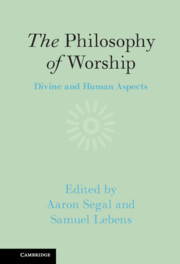Book contents
- The Philosophy of Worship
- The Philosophy of Worship
- Copyright page
- Contents
- Contributors
- Part I Two Introductions
- Part II What Is Worship?
- Part III Normative Aspects
- 7 Monotheism, Worship, and the Good
- 8 Can I Both Blame and Worship God?
- 9 Worship, Excellence, and Intrinsic Value
- 10 What’s Wrong with Idolatry, and Why There Is No Excuse
- 11 Owing God Worship
- 12 Worship for Atheists
- Part IV Forms and Functions of Worship
- Index
- References
8 - Can I Both Blame and Worship God?
from Part III - Normative Aspects
Published online by Cambridge University Press: 09 January 2025
- The Philosophy of Worship
- The Philosophy of Worship
- Copyright page
- Contents
- Contributors
- Part I Two Introductions
- Part II What Is Worship?
- Part III Normative Aspects
- 7 Monotheism, Worship, and the Good
- 8 Can I Both Blame and Worship God?
- 9 Worship, Excellence, and Intrinsic Value
- 10 What’s Wrong with Idolatry, and Why There Is No Excuse
- 11 Owing God Worship
- 12 Worship for Atheists
- Part IV Forms and Functions of Worship
- Index
- References
Summary
In a well-known apocryphal story, Theresa of Avila falls off the donkey she was riding, straight into mud, and injures herself. In response, she seems to blame God for her fall. A playful if indignant back and forth ensues. But this is puzzling. Theresa should never think that God is blameworthy. Why? Apparently, one cannot blame what one worships. For to worship something is to show it a kind of reverence, respect, or adoration. To worship is, at least in part, to praise. You cannot praise and blame simultaneously. Indeed, Paul counsels against “back-talk” against God, suggesting we lack the standing to blame our creator (Romans 9:20). Drawing on Strawsonian theorizing about praise and blame, this chapter argues that, surprisingly, a person can both blame and worship God. Although blameful worship is possibly epistemically akratic, it may sometimes be acceptable given our nature as finite, emotional beings. In fact, blaming God might on occasion be the only way we have to stand with God’s goodness despite apparent evidence of evil in the world. This suggestion, I’ll argue, should change the way we think about the problem of evil. The problem has interpersonal and moral psychological dimensions that merit serious attention.
- Type
- Chapter
- Information
- The Philosophy of WorshipDivine and Human Aspects, pp. 133 - 151Publisher: Cambridge University PressPrint publication year: 2025

